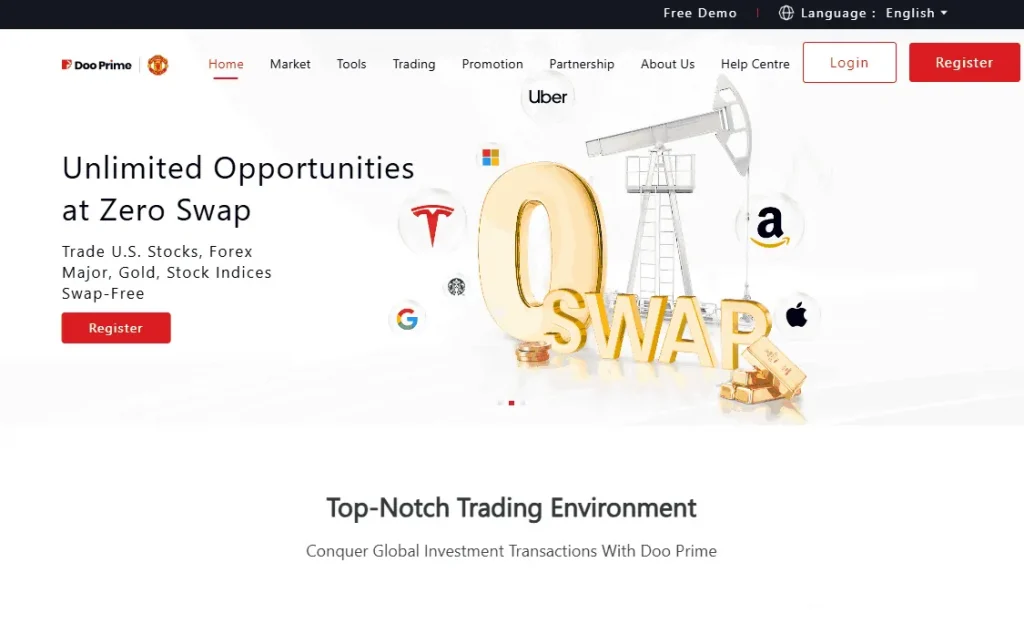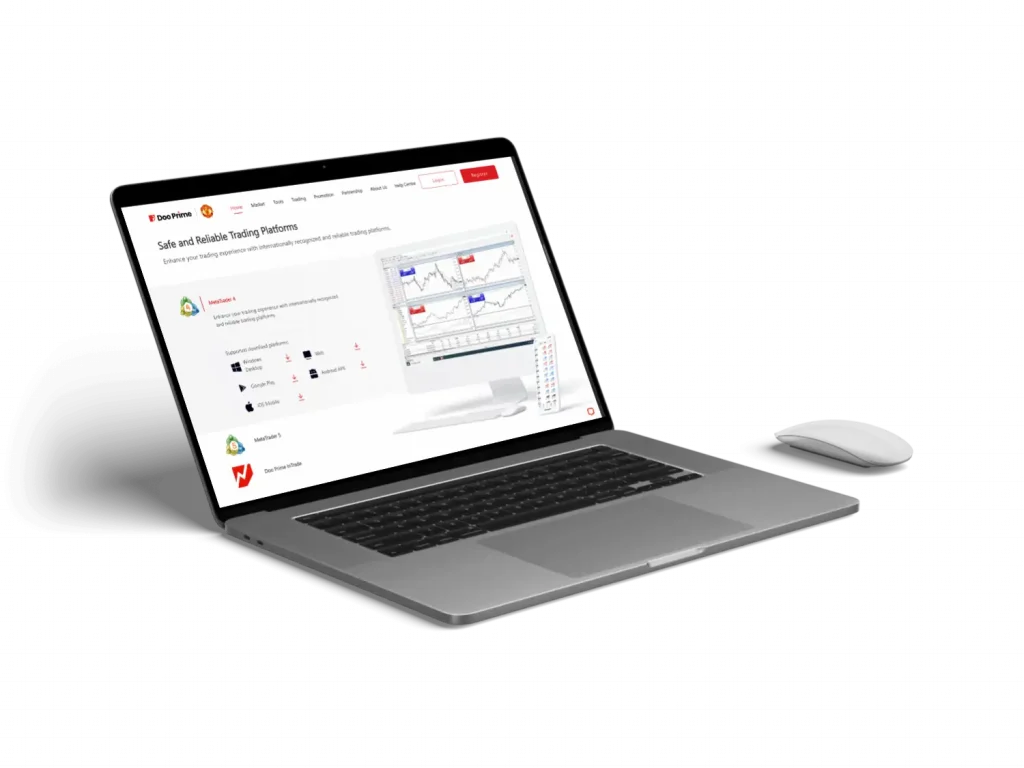Doo Prime Commissions spreads
Trade U.S. Stocks, Forex, Major, Gold, Stock Indices, Swap-Free
Table of Contents
Understanding Doo Prime's Commission Structure
Doo Prime offers a transparent commission structure designed to accommodate various trading styles and preferences. The company’s pricing model is built on the premise of providing competitive rates while maintaining high-quality execution. Doo Prime’s commission structure varies based on account types, traded instruments, and volume. Traders can choose between accounts with raw spreads plus commission or slightly wider spreads with no additional commission. This flexibility allows clients to select the pricing model that best suits their trading strategy.
Spread Types and Variations
| Account Type | Spread Type | Minimum Spread (pips) | Commission |
| STP Account | Variable | 1.0 | None |
| ECN Account | Raw | 0.0 | $7 per lot |
| CENT Account | Fixed | 1.5 | None |
Commission Rates for Different Instruments
Doo Prime’s commission rates vary across different financial instruments:
- Forex pairs
- Stocks and indices
- Commodities
- Cryptocurrencies
- Futures
For forex trading on ECN accounts, Doo Prime charges a commission of $7 per standard lot (100,000 units) round turn. Stock CFD trades incur a commission of 0.1% of the trade value. Commodity and cryptocurrency trades have specific commission structures based on the instrument and account type.
Volume-Based Discounts
Doo Prime offers volume-based discounts on commissions for high-volume traders. These discounts are applied on a tiered system, with rates decreasing as trading volume increases. The discount structure incentivizes active trading while reducing overall costs for frequent traders. Volume is calculated on a monthly basis, with discounts applied to the following month’s trades.

Spread Comparisons Across Major Instruments
Doo Prime maintains competitive spreads across its range of trading instruments. For major forex pairs, spreads can start from as low as 0.0 pips on ECN accounts. Popular stock indices like the S&P 500 and NASDAQ typically have spreads starting from 0.4 points. Commodity spreads vary, with gold often starting from 0.3 pips and crude oil from 0.04 points. These spreads are subject to market conditions and may widen during times of high volatility or low liquidity.
Spread Widening During Volatile Periods
During significant market events or economic releases, Doo Prime may temporarily widen spreads to manage risk. This practice is common in the industry and helps maintain market stability. Doo Prime communicates any anticipated spread widening to clients through its market news and analysis section, allowing traders to factor these changes into their strategies.
Account Types and Associated Costs
- STP Account
- ECN Account
- CENT Account
- Professional Account
- Institutional Account
| Feature | STP Account | ECN Account | CENT Account |
| Minimum Deposit | $100 | $100 | $10 |
| Spread Type | Variable | Raw | Fixed |
| Minimum Lot Size | 0.01 | 0.01 | 0.01 |
| Maximum Leverage | 1:500 | 1:500 | 1:500 |
| Commission | No | Yes | No |
Additional Trading Costs
Beyond spreads and commissions, traders should be aware of other potential costs:
- Overnight financing (swap rates)
- Inactivity fees
- Withdrawal fees
- Currency conversion fees
- Dividend adjustments for CFDs
Overnight financing applies to positions held beyond the daily cut-off time. Doo Prime’s swap rates are competitive and transparently displayed in the contract specifications. Inactivity fees may apply to accounts without trading activity for an extended period. Withdrawal fees vary depending on the chosen method, with some options offering free withdrawals.
Dividend Adjustments for CFD Trading
When trading stock CFDs, dividend adjustments affect open positions. For long positions, Doo Prime credits the dividend amount to the trader’s account. Short positions result in a debit. These adjustments reflect the economic impact of dividends on stock prices. Doo Prime calculates dividend adjustments based on the ex-dividend date of the underlying stock.

Tools for Calculating Trading Costs
Doo Prime provides several tools to help traders estimate their trading costs:
- Pip calculator
- Margin calculator
- Swap calculator
- Trading cost estimator
- Economic calendar
These tools are accessible through the Doo Prime client portal and trading platforms. The pip calculator helps determine the value of a pip for different currency pairs and account currencies. The margin calculator assists in estimating required margin for various positions. Traders can use the swap calculator to estimate overnight financing costs for held positions.
Comparison with Industry Standards
Doo Prime’s commission and spread structure is competitive when compared to industry standards. The company’s ECN offering, with spreads starting from 0.0 pips plus commission, is particularly attractive for high-volume traders. Doo Prime’s STP Account spreads are in line with or better than many competitors, especially for major forex pairs and popular indices. The company’s transparency in displaying all costs upfront sets it apart in the market.
Instrument | Doo Prime (ECN) | Industry Average |
EUR/USD | 0.0 + $7 commission | 0.8 pips |
Gold | 0.3 pips | 0.5 pips |
S&P 500 | 0.4 points | 0.6 points |
Apple CFD | 0.1% commission | 0.15% commission |
FAQ:
Doo Prime offers competitive spreads, starting from 0.0 pips on ECN accounts for major forex pairs. This is comparable to or better than many industry leaders. However, it’s important to consider the additional commission on ECN accounts when comparing total trading costs.
Doo Prime prides itself on transparency. All fees, including spreads, commissions, overnight financing, and any additional charges, are clearly outlined in the contract specifications and account details. There are no hidden fees, but traders should familiarize themselves with all potential costs associated with their chosen account type and trading instruments.
Yes, Doo Prime allows clients to change their account type. You can request an account change through the client portal or by contacting customer support. Be aware that changing account types may involve different minimum deposit requirements and trading conditions. It’s advisable to review all account features before making a switch.

